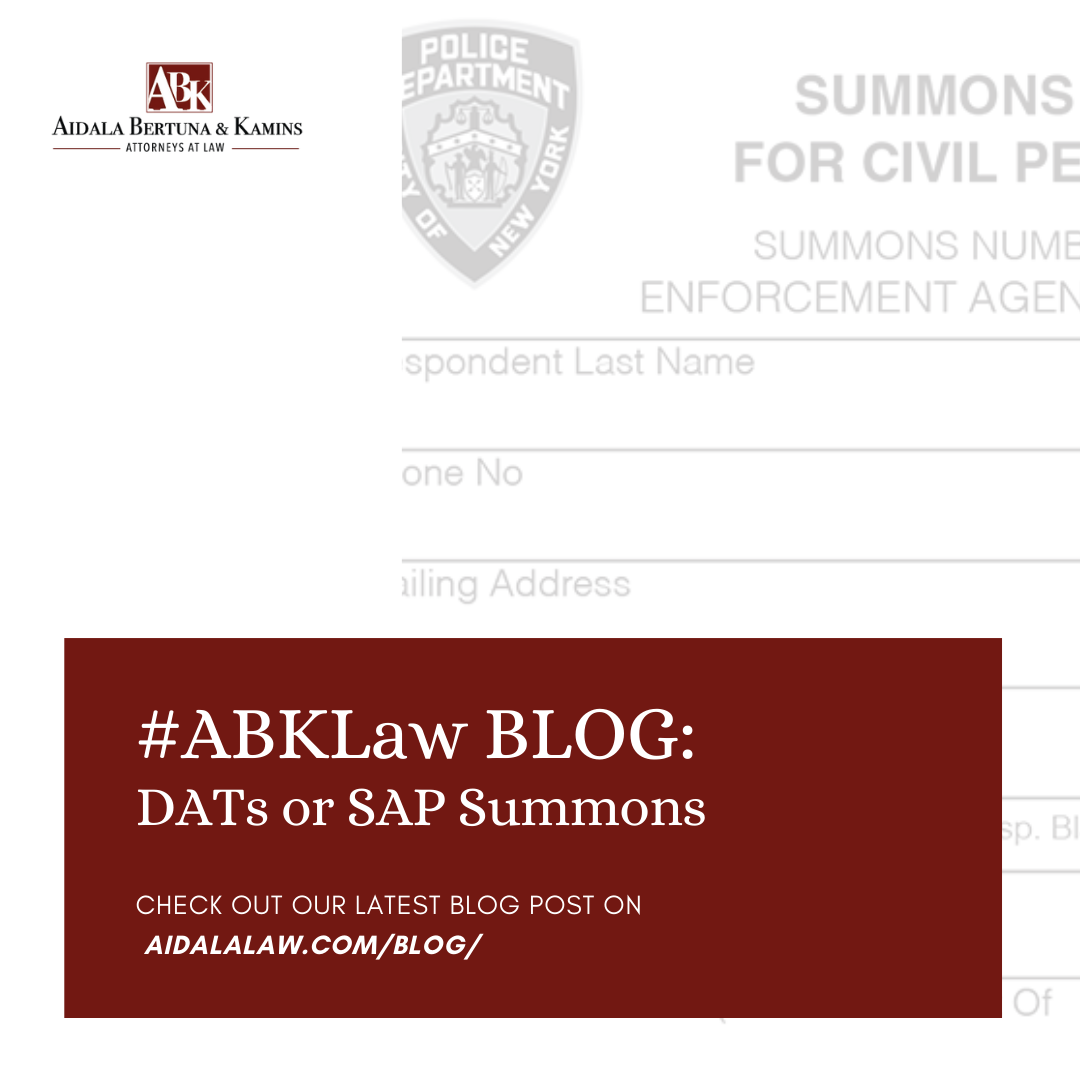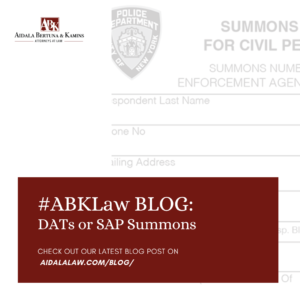
27 Mar ABKLaw BLOG: DATs or SAP Summons
BLOG from our #ABKLaw Partner Michael Jaccarino, Esq.: DATs or SAP Summons
You’ve been arrested and given a DAT or a Summons – Now What?
Enforcement of low-level offenses in New York City has always been arbitrary and inconsistent. Examples of such offenses are trespass, consumption of alcohol in public, possession of marijuana, being in a park after dark, unlicensed vendor, unlicensed vehicle operator, and disorderly conduct. In NYC, there are a few options for how to deal with low-level offenses – an officer can effectuate an arrest, resulting in either a desk appearance ticket (DAT) or formal arraignment, or the officer may issue a criminal or civil summons. There is little official guidance on which method is preferred, leaving it entirely up to the direction of the individual officer.
In New York, receiving a desk appearance ticket (DAT) means you have legally been arrested. It is an order to appear in court and respond to the accusation against you. Because individuals are not handcuffed during this type of arrest, many people confuse a DAT with a mere traffic ticket and assume that the DAT does not really matter. It does.
You will still be facing the same potential consequences for a conviction—usually up to a year in jail—as you would if you were arrested in any other way.
In most cases, desk appearance tickets (DATs) are reserved for certain nonviolent misdemeanor charges, such as petit larceny, property damage, harassment, or jumping a turnstile.
If you are issued a DAT and wait for the court to assign you a legal aid attorney or public defender, you may end up significantly decreasing your chances of a positive outcome. In most cases, you will not actually appear in court or meet the public defender until weeks after you receive the desk appearance ticket. By that time, important evidence in your favor may have disappeared. Make sure you contact a criminal defense attorney sooner, rather than later, because you need someone who can take swift action on your behalf. There are plenty of things to be done immediately, such as obtaining copies of any videos of the alleged crime scene, obtaining phone or text message records, interviewing any witnesses to the alleged crime, carefully and thoroughly reviewing your case to prepare a strong defense, and most importantly; Offer the one-on-one attention you deserve
An arrest for a misdemeanor will be handled in the Criminal Court of the City of New York. A Summons will be handled in the Summons Part (SAP) that deals with lesser offenses. This is just the start of the differences between the two. Once ARRESTED, defendants are processed, fingerprinted, and their data is stored in arrest records. They are also held in the precinct for hours and, if not issued a DAT, taken to Central Booking for arraignment before a Judge, where bail may be set. Also, in the SAP Part, there are no prosecutors present, no mandatory court surcharges and no warrants issued if a defendant fails to pay a court-ordered fine. In short, the SAP Part is a much more preferable place to be. However, the issuance of a summons should not be taken lightly.
Many people assume that a pink summons is exactly like a traffic ticket and therefore not necessarily a big deal or something that would require the assistance of a lawyer. This is wrong. While it is true that most pink summons cases end up working out in ways that are not terrible for the clients’ future, there is often more at stake for someone who walks into a Summons courtroom most people realize.
More often than people might expect, the offenses charged in pink summonses are actually CRIMES. That means that if you just went into court and “plead guilty,” you would be pleading guilty to a crime and you would have a criminal record.

Call our office to learn more, or if you have a particular legal matter that requires immediate attention: 212-486-0011 or email us at Info@AidalaLaw.com.
#NewYorkLaw #NYLawFirm #CriminalDefense #CivilLitigation #Appellate #AttorneyDisciplinary #RealEstate #PersonalInjury #EmploymentLaw



